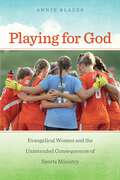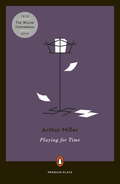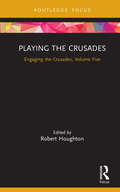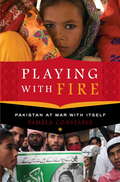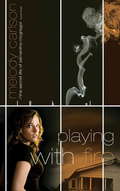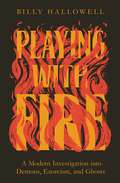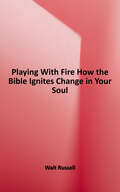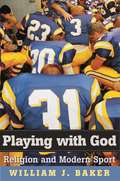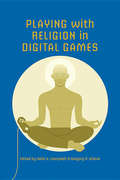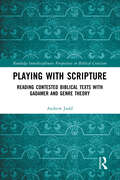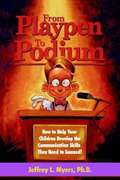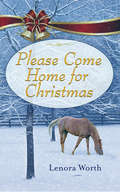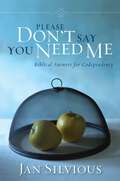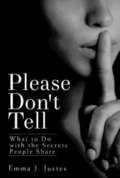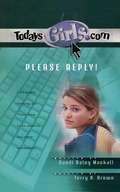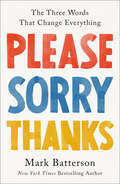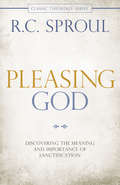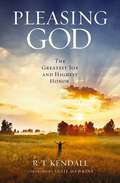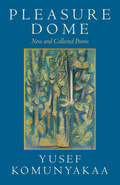- Table View
- List View
Playing for God: Evangelical Women and the Unintended Consequences of Sports Ministry (North American Religions)
by Annie BlazerWhen sports ministry first emerged in the 1950s and 1960s, its founders imagined male celebrity athletes as powerful salespeople who could deliver a message of Christian strength: “If athletes can endorse shaving cream, razor blades, and cigarettes, surely they can endorse the Lord, too,” reasoned Fellowship of Christian Athletes founder Don McClanen. But combining evangelicalism and sport did much more than serve as an advertisement for religion: it gave athletes the opportunity to think about the embodied experiences of sport as a way to experience intimate connection with the divine. As sports ministry developed, it focused on individual religious experiences and downplayed celebrity sales power, opening the door for female Christian athletes to join and eventually dominate sports ministry. Today, women are the majority of participants in sports ministry in the United States. In Playing for God, Annie Blazer offers an exploration of the history and religious lives of Christian athletes, showing that evangelical engagement with popular culture can carry unintended consequences. When sport became an avenue for embodied worship, it forced a reckoning with evangelical teachings about the body. Female Christian athletes increasingly turned to their own bodies to understand their religious identity, and in so doing, came to question evangelical mainstays on gender and sexuality. What was once a male-dominated masculinist project of sports engagement became a female-dominated movement that challenged evangelical ideas on femininity, marriage hierarchy, and the sinfulness of homosexuality. Though evangelicalism has not changed sporting culture, for those involved in sports ministry, sport has changed evangelicalism.
Playing for Time (Penguin Plays)
by Arthur MillerA searing drama of the Holocaust--and the remarkable, moving story of the Auschwitz Women's Orchestra Paris, 1942. Fania Fénelon, a popular Jewish nightclub singer, is arrested by the occupying Germans. <P><P>Sent to Auschwitz in a packed freight-car, shorn of her hair, tattooed with an identifying number, starved, and subjected to harsh labor, she loses all traces of her former self. But her life at the camp changes dramatically when she is drafted into the Women's Orchestra, a desperate little ensemble that marches the prisoners out to work and gives concerts for the German high brass. Led by Alma Rosé, a sternly ambitious German-Jewish conductor who knows that her job is a matter of life and death, Fania and her fellow musicians must confront the horror taking place around them while pushing themselves to create beauty in the midst of despair. <P> Based on Fania Fénelon's memoir of the same name, Arthur Miller's Playing for Time was first produced as a CBS television drama starring Vanessa Redgrave before being adapted for the stage.
Playing the Crusades: Engaging the Crusades, Volume Five (Engaging the Crusades)
by Robert HoughtonEngaging the Crusades is a series of volumes which offer windows into a newly emerging field of historical study: the memory and legacy of the crusades. Together these volumes examine the reasons behind the enduring resonance of the crusades and present the memory of crusading in the modern period as a productive, exciting, and much needed area of investigation. This volume considers the appearance and use of the crusades in modern games; demonstrating that popular memory of the crusades is intrinsically and mutually linked with the design and play of these games. The essays engage with uses of crusading rhetoric and imagery within a range of genres – including roleplaying, action, strategy, and casual games – and from a variety of theoretical perspectives drawing on gender and race studies, game design and theory, and broader discussions on medievalism. Cumulatively, the authors reveal the complex position of the crusades within digital games, highlight the impact of these games on popular understanding of the crusades, and underline the connection between the portrayal of the crusades in digital games and academic crusade historiography. Playing the Crusades is invaluable for scholars and students interested in the crusades, popular representations of the crusades, historical games, and collective memory.
Playing with Fire
by Pamela ConstableA volatile nation at the heart of major cultural, political, and religious conflicts in the world today, Pakistan commands our attention. Yet more than six decades after the country's founding as a Muslim democracy, it continues to struggle over its basic identity, alliances, and direction. In Playing with Fire, acclaimed journalist Pamela Constable peels back layers of contradiction and confusion to reveal the true face of modern Pakistan.In this richly reported and movingly written chronicle, Constable takes us on a panoramic tour of contemporary Pakistan, exploring the fears and frustrations, dreams and beliefs, that animate the lives of ordinary citizens in this nuclear-armed nation of 170 million. From the opulent, insular salons of the elite to the brick quarries where soot-covered workers sell their kidneys to get out of debt, this is a haunting portrait of a society riven by inequality and corruption, and increasingly divided by competing versions of Islam.Beneath the façade of democracy in Pakistan, Constable reveals the formidable hold of its business, bureaucratic, and military elites--including the country's powerful spy agency, the ISI. This is a society where the majority of the population feels powerless, and radical Islamist groups stoke popular resentment to recruit shock troops for global jihad. Writing with an uncommon ear for the nuances of this conflicted culture, Constable explores the extent to which faith permeates every level of Pakistani society--and the ambivalence many Muslims feel about the role it should play in the life of the nation.Both an empathic and alarming look inside one of the world's most violent and vexing countries, Playing with Fire is essential reading for anyone wishing to understand modern Pakistan and its momentous role on today's global stage.From the Hardcover edition.
Playing with Fire (The Secret Life of Samantha Mcgregor, Book #3)
by Melody CarlsonIf your vision led you straight into the fire,would you follow it anyway?Samantha's brother, Zach, is finally home after a ninety-day rehab for his meth addiction, and life seems to be getting back to normal. That is, until Sam starts having dreams about dangerous situations involving drugs. But her visions are so vague that she doesn't know who needs help. Of course she's worried about Zach staying clean, especially since he's hanging with the wrong crowd. But the whole school seems to be buzzing about drugs, and Sam doesn't know who's using and who's not. What is wrong with these people anyway?Then Sam has a vision of a burning cabin, and this time someone has been shot. Convinced that Zach is involved somehow, Sam chooses to leave Detective Ebony Hamilton out of the loop. If Zach really is involved, this will land him in jail for sure! But her own investigation is getting too hot to handle, and Sam must decide whether to risk getting Zach in trouble with the law- or ultimately risk his life.From the Trade Paperback edition.
Playing with Fire: A Modern Investigation into Demons, Exorcism, and Ghosts
by Billy Hallowell&“Provocative, insightful, and enlightening—a foray into an often-neglected topic that merits more attention than it typically receives.&”--Lee Strobel, New York Times bestselling author of The Case for ChristWhat is Our Fascination with the Other Side?Join investigative reporter Billy Hallowell as he delves into the strange phenomena of supernatural activity. Themes of demonic possession, exorcism, and ghosts have overtaken Hollywood, with countless films and TV shows delving into the age-old struggle against evil. But the question is why?Even with so much focus on the topic, there seems to be very little public knowledge and discussion about the theology and real-life claims surrounding demons. Quite often, many people remain silent about their experiences or resort to quietly whispering about what they&’ve seen, heard, or felt for fear of being labeled as crazy. The truth is, even pastors, priests, and clergy who have observed firsthand accounts of possession and deliverance can succumb to the strange and terrifying effects of intense spiritual warfare.For people of faith, Playing with Fire addresses these core questions:Are demons active today?If they do indeed exist, what are they? Fallen angels? Nephilim?Can demons inhabit human beings?According to the Bible, can people die and remain behind as &“ghosts&”?Playing with Fire explores the theological underpinnings surrounding the supernatural. Relying on firsthand accounts, newspaper reports, and Christian experts, Hallowell takes readers through the various views and perspectives surrounding supernatural activity.
Playing with Fire: How the Bible Ignites Change in Your Soul
by Walt RussellBible scholar Walt Russell insists that studying the Scriptures properly is like playing with fire―a fire that can ignite dramatic change in our souls. With an intelligent, engaging style, Russell puts the tools in your hands that enable you to study different styles of biblical writing in depth. And this fuller understanding of God’s Word unleashes a heart-transforming power that burns away your defenses like fire, bringing radical change to your life.
Playing with God: Religion and Modern Sport
by William J. BakerThe spectacle of modern sport displays all the latest commercial and technological innovations, yet age-old religious concerns still thrive at the stadium. Coaches lead pre-game and post-game prayers, athletes give God the credit for home runs and touchdowns, and fans wave signs with biblical quotations and allusions. Like no other nation on earth, Americans eagerly blend their religion and sports. Playing with God traces this dynamic relationship from the Puritan condemnation of games as sinful in the seventeenth century to the near deification of athletic contests in our own day. <P><P>Early religious opposition to competitive sport focused on the immoderate enthusiasm of players and spectators, the betting on scores, and the preference for playing field over church on Sunday. Disapproval gradually gave way to acceptance when "wholesome recreation" for young men in crowded cities and soldiers in faraway fields became a national priority. Protestants led in the readjustment of attitudes toward sport; Catholics, Jews, Mormons, and Muslims followed. The Irish at Notre Dame, outstanding Jews in baseball, Black Muslims in the boxing ring, and born-again athletes at Liberty University represent the numerous negotiations and compromises producing the unique American mixture of religion and sport.
Playing with God: Religion and Modern Sport
by William J. BakerThe spectacle of modern sport displays all the latest commercial and technological innovations, yet age-old religious concerns still thrive at the stadium. Coaches lead pre-game and post-game prayers, athletes give God the credit for home runs and touchdowns, and fans wave signs with biblical quotations and allusions. Like no other nation on earth, Americans eagerly blend their religion and sports. Playing with God traces this dynamic relationship from the Puritan condemnation of games as sinful in the seventeenth century to the near deification of athletic contests in our own day. Early religious opposition to competitive sport focused on the immoderate enthusiasm of players and spectators, the betting on scores, and the preference for playing field over church on Sunday. Disapproval gradually gave way to acceptance when "wholesome recreation" for young men in crowded cities and soldiers in faraway fields became a national priority. Protestants led in the readjustment of attitudes toward sport; Catholics, Jews, Mormons, and Muslims followed. The Irish at Notre Dame, outstanding Jews in baseball, Black Muslims in the boxing ring, and born-again athletes at Liberty University represent the numerous negotiations and compromises producing the unique American mixture of religion and sport.
Playing with Religion in Digital Games
by Heidi A. Campbell Gregory P. GrieveShaman, paragon, God-mode: modern video games are heavily coded with religious undertones. From the Shinto-inspired Japanese video game Okami to the internationally popular The Legend of Zelda and Halo, many video games rely on religious themes and symbols to drive the narrative and frame the storyline. Playing with Religion in Digital Games explores the increasingly complex relationship between gaming and global religious practices. For example, how does religion help organize the communities in MMORPGs such as World of Warcraft? What role has censorship played in localizing games like Actraiser in the western world? How do evangelical Christians react to violence, gore, and sexuality in some of the most popular games such as Mass Effect or Grand Theft Auto? With contributions by scholars and gamers from all over the world, this collection offers a unique perspective to the intersections of religion and the virtual world.
Playing with Scripture: Reading Contested Biblical Texts with Gadamer and Genre Theory (Routledge Interdisciplinary Perspectives on Biblical Criticism)
by Andrew JuddThis book puts a creative new reading of Hans-Georg Gadamer’s philosophical hermeneutics and literary genre theory to work on the problem of Scripture. Reading texts as Scripture brings two hermeneutical assumptions into tension: that the text will continually say something new and relevant to the present situation, and that the text has stability and authority over readers. Given how contested the Bible’s meaning is, how is it possible to ‘read Scripture’ as authoritative and relevant? Rather than anchor meaning in author, text or reader, Gadamer’s phenomenological model of hermeneutical experience as Spiel (‘play’) offers a dynamic, intersubjective account of how understanding happens, avoiding the dead end of the subjective–objective dichotomy. Modern genre theory addresses some of the criticisms of Gadamer, accounting for the different roles played by readers in different genres using the new term Lesespiel (‘reading game’). This is tested in three case studies of contested texts: the recontextualization of psalms in the book of Acts, the use of Hagar’s story (Genesis 16) in nineteenth-century debates over slavery and the troubling reception history of the rape and murder in Gibeah (Judges 19). In each study, the application of ancient text to contemporary situation is neither arbitrary, nor slavishly bound to tradition, but playful.
Playing with Scripture: Reading Contested Biblical Texts with Gadamer and Genre Theory (Routledge Interdisciplinary Perspectives on Biblical Criticism)
by Andrew JuddThis book puts a creative new reading of Hans-Georg Gadamer’s philosophical hermeneutics and literary genre theory to work on the problem of Scripture. Reading texts as Scripture brings two hermeneutical assumptions into tension: that the text will continually say something new and relevant to the present situation, and that the text has stability and authority over readers. Given how contested the Bible’s meaning is, how is it possible to ‘read Scripture’ as authoritative and relevant? Rather than anchor meaning in author, text or reader, Gadamer’s phenomenological model of hermeneutical experience as Spiel (‘play’) offers a dynamic, intersubjective account of how understanding happens, avoiding the dead end of the subjective–objective dichotomy. Modern genre theory addresses some of the criticisms of Gadamer, accounting for the different roles played by readers in different genres using the new term Lesespiel (‘reading game’). This is tested in three case studies of contested texts: the recontextualization of psalms in the book of Acts, the use of Hagar’s story (Genesis 16) in nineteenth-century debates over slavery and the troubling reception history of the rape and murder in Gibeah (Judges 19). In each study, the application of ancient text to contemporary situation is neither arbitrary, nor slavishly bound to tradition, but playful.
Playpen to the Podium
by Jeff Myers"Your home," writes Jeff Myers, "can be a living, breathing communication workshop far better than any class your child will ever take." "This book contains all of the tools you need for the task of giving your child the communication advantage in every area of life. You will discover how to help your child become more comfortable in social situations, think more clearly, read and write more effectively, take a stand more boldly, analyze more carefully, and speak more articulately."
Pleasant Hill and Its Shakers
by Thomas D Clark F Gerald HamThe Shakers at Pleasant Hill had a vital impact for more than six decades on the development of Kentucky. Settling in Central Kentucky in 1805 to establish a religious communal village, they brought a standard of excellence and innovativeness that reached far beyond their group. Since its inception in 1961 as a nonprofit, educational corporation, Shakertown at Pleasant Hill, Kentucky, Inc., has striven to fulfill its charter responsibilities to preserve and maintain twenty-seven of the nineteenth century Shaker buildings extant, and to interpret the 1805-1910 history they depict. These structures range in size from a massive forty-room stone dwelling to a three-story brick office, an admirable example of "Shaker Georgian", to a small clapboard shop. Today, a variety of adaptative uses offers the visitor a range of experiences and services: exhibition tour, museum, river cruise, overnight accommodations, dining, and craft sales shop. This book's author, Dr. Thomas D. Clark, has been intimately associated with the Shaker Village of Pleasant Hill restoration efforts from the beginning and has watched the progress with keen interest. He narrates the story of these fascinating people with knowledge, warmth, humor, and dramatic animation. Few outdoor history museums have been blessed with having a noted historian and writer of Dr. Clark's caliber on the scene to recount their history.
Pleasant Hill and Its Shakers
by Thomas D. Clark F. Gerald HamFROM THE BACK COVER The Shakers at Pleasant Hill had a vital impact for more than six decades on the development of Kentucky. Settling in Central Kentucky in 1805 to establish a religious communal village, they brought a standard of excellence and innovativeness that reached far beyond their group. nces and services: exhibition tour, museum, river cruise, overnight accommodations, dining, and craft sales shop. This book's author, Dr. Thomas D. Clark, has been intimately associated with the Shaker Village of Pleasant Hill restoration efforts from the beginning and has watched the progress with keen interest. He narrates the story of these fascinating people with knowledge, warmth, humor, and dramatic animation. Few outdoor history museums have been blessed with having a noted historian and writer of Dr. Clark's caliber on the scene to recount their history
Please Come Home for Christmas: A Novella (Sleigh Bells Ring)
by Lenora WorthIn the air there’s a feeling of Christmas . . . and something fishy.Her heart ought to be on the naughty list. Amy has hardly shown her son around the family horse farm or brushed a thoroughbred before she’s fraternizing with the enemy. It’s been awhile since her husband died, since her heart felt this way.But after real estate developer Dan Wentworth has been so cozy with her sisters about selling their newly inherited property, Amy can’t be sure if he’s warming up to her. Or merely warming her up to the idea of letting the family homestead be bulldozed for a housing development.She doesn’t want to hurt her sisters, but the money from Dan’s proposal could go a long way in making single-motherhood merry and bright.
Please Don't Say You Need Me: Biblical Answers for Codependency
by Jan SilviousPlease Don’t Say You Need Me . . . is a common plea voiced by people trapped in unhealthy, codependent relationships. Confused by their conflicting emotions, they feel trapped between wanting to love and care for someone else and yet, at the same time, needing to escape from that person’s intense and suffocating demands for self-esteem. Jan Silvious offers practical, biblical answers for those dealing with codependency—actually, people-dependency—that can exist between mates, siblings, parents and children, and friends. · Who is the codependent person? · What is a codependent relationship? · What role does guilt play in a codependent relationship? · Can Christians be codependent? Jan Silvious answers these questions and shows readers how to identify and break the cycle of a codependent relationship in a loving, scriptural manner. Here is insight, hope, and encouragement for replacing unhealthy ways of relating with a new approach that can bring balance and wholeness.
Please Don't Tell: What to Do with the Secrets People Share
by Emma J. Justes"I’ve never told a soul, and you have to promise not to tell anybody." "Pastor, I wanted you to know before we tell the kids, just in case they come to you." "I’m so happy. Yes, finally, I’m pregnant. I just had to tell someone." "Yes, it's terrible, but am I going to explain it to our friends here at church?"People need trusted persons as sounding boards and confidants. Not many weeks go by that someone does not confide a secret to a church leader, whether pastor, youth director, church secretary, choir director, or board member. While pastors have a unique role when it comes to confidentiality, listening to secrets is something that every church leader does. But there are both privileges and responsibilities in reporting, discerning the truth, and helping people bear the deep sins or temper the anger that threatens to overflow.
Please Help Me, God (Letters From Covenant House)
by Sr. Mary Rose McGeadyThey are the children no one knows, nameless and faceless shadows that walk our streets, desperate and scared and alone. They are America's street children, and they are more than 1,000,000 strong. Entangled in a web of abuse and sex, these innocent kids--some as young as ten--struggle to find hope in a dark world few of us will ever know about, and none of us will ever see. Who exactly are these kids? How do they end up on our streets? Where do they come from? How do they manage to survive? Do they survive? This is their incredible story, told from the alleyways and dead-end streets of America. It's a story you will never, ever forget...." The last few chapters of the book offer valuable information. However, because the copyright date is 1997, this information might be outdated.
Please Reply!
by Dandi Daley MackallAs fifteen-year-old Jamie becomes involved in the swim team and Special Olympics coaching, as part of her effort to fit in and be normal, she tries to remember to talk to God.
Please, Sorry, Thanks: The Three Words That Change Everything
by Mark BattersonStrengthen your spiritual, mental, and emotional health and reach your most audacious goals with three simple but power-packed words—from the New York Times bestselling author of Win the Day.&“A practical framework to be the kind of thoughtful, helpful force for good you always wanted to be.&”—Carey Nieuwhof, founder of the Art of Leadership AcademyThe best predictor of success in life, in love, and in leadership is your proficiency at please, sorry, and thanks. Those three words are the foundation of all healthy relationships and successful careers. Those three words are the only ceiling on achieving your dreams. Those three words will determine how happy you are.With his trademark blend of personal stories, scientific and historical references, and biblical insight, Pastor Mark Batterson shows how you can change your world with your words:• A timely please can help you unlock the rule of reciprocity for greater results, discover the power of &“we is greater than me,&” and honor others above yourself.• A sincere sorry can lead you to mend broken relationships, strengthen connections through being radically vulnerable, and better understand the degrees of forgiveness.• A heartfelt thanks paves the way toward a resilient mindset of gratitude and an expectancy to see God move on your behalf.Whether you&’re launching out into a new phase of life or navigating long-established complexities, it's time to harness the power of those three transformative words and let them propel you wherever God leads you to go.
Pleasing God
by R. C. SproulDr. R.C. Sproul is one of the most vital and renowned theologians of our time. For over 40 years Dr. Sproul has encouraged, educated, and enlightened millions through his books, teaching, and ministry. How can imperfect people hope to please a perfect God? The answer is both simple and challenging: sanctification. Pleasing God takes an in-depth look at sanctification and its essential role in the life of every believer. Filled with Biblical insights, this release guides both new and seasoned Christians through God's path for transforming His people.
Pleasing God: The Greatest Joy and Highest Honor
by R.T. KendallPleasing God is a practical resource for Christian living that inspires believers to seek the greatest honor of anyone's lifetime--to have the privilege of pleasing God.Christ's total forgiveness means that we do not have to earn our salvation. When we give our lives to Jesus, we are justified by faith alone. Good works are not required. Prayer is not required. Practicing total forgiveness is not required. Wow--what a gift! But chances are, if you have been born again you want to do good works. You want to pray. You want to forgive and love your enemies. You desire to please God.In Pleasing God, bestselling author and well-known preacher, R.T. Kendall, unfolds the meaning of persistent faith. Starting with the story of Enoch, Dr. Kendall explores biblical teachings that call believers to "find out what pleases the Lord" (Ephesians 5:10).With biblical teaching, personal stories, and humble wisdom, Dr. Kendall answers these questions:What pleases God (and what displeases Him)?Why should we please God?How should we please God?Imagine the joy and peace that will come from pleasing God more than seeking approval from others. The world needs this book!
Pleasure Dome: New and Collected Poems (Wesleyan Poetry Series)
by Yusef KomunyakaaYusef Komunyakaa has become one of America's most compelling poets. Pleasure Dome gathers over twenty-five years of work, including early uncollected poems and a rich selection of new poems. Best known for Neon Vernacular, which won the Pulitzer Prize for Poetry in 1994, and for Dien Cai Dau, a collection of poems chronicling his experiences as a journalist in Vietnam, Yusef Komunyakaa has become one of America's most compelling poets. Pleasure Dome gathers the poems in these two distinguished books and five others—over two and a half decades of Komunyakaa's work. In addition, Pleasure Dome includes 25 early, uncollected poems and a rich selection of 18 new poems.
